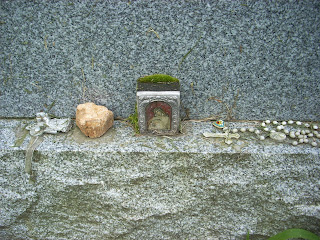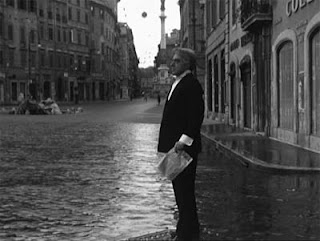
I woke, alert and nerved up at three this morning--insomnia always begins at three in the morning. I had been dreaming of trying to cook in the kitchen of the apartment where I grew up. The oven had no door. The refrigerator freezer, which also had no door, bulged with thick frost. Time to leave all that behind, I said to myself, and picked up E.M. Forster's "Collected Tales."
You've heard of "transitional objects," the fashionable term for any manner of security objects, from blankets to cell phones. I hate the term. I prefer to actually describe Forster's book printed in 1947. At five by seven inches, it fits in my hand. The weave of the blue cloth cover is palpable. The paper is slightly yellow, thick, matt, and the jaunty chapter-head decorations are by W.A. Dwiggins. (I'm going to look him up.) It's a pleasure to thumb the dry, matt deckle edge. So much for pleasure.

I began reading where I had left off, page 198, the beginning of a story, "The Point of It," thinking it would be another charming fantasy tale. Not so. Forster's portrayal of hell made my hair stand on end: when Micky, the central character, "opened his mouth to laugh, it filled with dust. Choosing to open his eyes, he found that he had swollen enormously, and lay sunk in the sand of an illimitable plain . . . . Nothing moved on its surface except a few sand-pillars, which would sometimes merge into each other as though confabulating, and then fall with a slight hiss. Save for these, there was no motion, no noise, nor could he feel any wind." Forster goes on: "It seemed to Micky that he had lain in the dust for ever, suffering an sneering, and that the essence of all things, the primal power that lies behind the stars, is senility." Hell "degraded while it tortured." Why is he there?--"he was suffering for all the praise that he had given to the bad and mediocre upon earth; when he had praised out of idleness, or to please people, or to encourage people; for all the praise had not been winged with passion." Micky had lived a supremely benign, successful life. His wife was also in hell; while he had been to soft, she had been too hard. What was I? I asked myself. Not as nice as Micky, but too nice, I answered.
How to escape the too soft and the too hard? For Forster, in this story, by rowing to ecstasy. About another character, Forster writes: "He made himself all will and muscle. He began not to know where he was. The thrill of the stretcher against his feet, and the tide up his arms, merged with his friend's voice towards one nameless sensation; he was approaching the mystic state that is the athlete's true though unacknowledged goal: he was beginning to be." This kind of feat is beyond my powers, but all day I've been thinking of "The Point of It," and how to keep my mouth from filling with dead dust.
From left: Peter Pears, E.M. Forster, Robin Long, Benjamin Britten, Billy Burrell, at Aldeburgh, 1949.










.jpg)











































